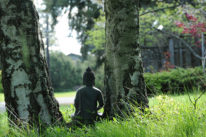
“People usually consider walking on water or in thin air a miracle. But I think the real miracle is not to walk either on water or in thin air, but to walk on earth. Every day we are engaged in a miracle which we don’t even recognize: a blue sky, white clouds, green leaves, the black, curious eyes of a child—our own two eyes. All is a miracle.” ~Thich Nhat Hanh
I remember it clearly, the day it all began to click. People talk about epiphanies that changed their lives in an instant, and mine was no different. Problem was, this change turned into a ten-year journey of slow and sometimes painful self-discovery.
I was standing outside with my wife and a friend. I don’t recall what we were talking about, but I do recall listening to my friend before he blurted, “I hate when you do that, Josh!”
I was confused, so I asked, “Do what?”
He replied, “You stopped listening and now you’re thinking about the next thing you’re going to say.”
My confusion turned to embarrassment. “No! I don’t do that—do I?” I looked at my wife—she nodded in agreement.
That moment changed my life. It was like hearing a starting pistol go off on a project that would eventually take me down a rocky path of self-reflection over the next decade, but it was a feeling I never wanted to experience again.
I’m not referring to the feeling of shame and embarrassment or being “caught,” but the feeling of knowing that my lack of awareness was the cause of others’ suffering.
I desired to be a better husband, father, and friend, so I began studying mindfulness, which led me to conduct doctoral research on how mindful presence affects our everyday interactions.
What I discovered was a set of seven principles we can all expect from becoming fully immersed in the present moment:
1. Mindful presence creates a heightened awareness of what we do in the moment…
…including thoughts as they arise, our actions taken as a result of those thoughts, and the impact of those thoughts and actions on others.
2. Mindful presence is the catalyst for self-reflection.
Simply put, the more present we are, the more we compare that moment to previous interactions, facilitating greater change for the better.
3. Mindful presence nurtures unconditional acceptance, particularly in our close relationships.
As things happen and we maintain presence, we are more likely to accept them without judgment.
4. Mindful presence evokes interaction.
As we immerse ourselves into the moment, others notice. As they notice our presence, it creates gravity, drawing us closer together. As we become present, we see others inviting us into interaction, because people want to be around others who are willing to invest time.
5. The more aware we are of the greatness of others, the more likely we will feel pride for those we care about.
As we feel that pride, we outwardly express it and others notice. This encourages others to strive further through the very initiative we nurtured through our presence.
6. In moments of mindful presence, we are more likely to experience savoring the moment as we marvel in wonder at the simplest beauty.
Heightened appreciation adds color, depth, and richness to everyday experiences.
7. The self-reflection referred to in #2 above results in a greater capacity for gratitude.
As we reflect, we savor, and as we savor, we become thankful.
Wonderful, right? If I was reading this list, I know I would feel drawn toward acting more mindfully, but the next question is, how do we get there?
Here are five ways mindfulness can be practiced and refined. I encourage you to try them all on a regular, rotating basis:
1. One of the simplest methods is to walk with no destination in mind.
This could be done at a trip to the store, around your neighborhood, or even at your local mall. Let go of all thought of a schedule or an agenda, and simply allow yourself to go wherever your mood takes you. Surrender yourself to the flow.
Interestingly enough, driving reduces the angle of your field of vision by up to 75%, depending on speed. Walking allows you to see more of your surroundings, so take it in, but remind yourself as you walk: there is nowhere more important for you to be than right here, right now.
2. Eat your food and consume your drink as if they were your last.
Sure, dinner might have been a cheap frozen dinner, but how would you eat that same meal if you knew it might be your last? Would you slow yourself down and savor it more? What would this do for your appreciation of what you consume.
Another way of eating involves not taking a single bite or drink until you have silently thanked each and every individual responsible, from the farmer who cultivated the tealeaf, to the trucker who shipped it, to the grocer who placed it on the shelf.
Once you ponder all the hands that work to provide you that opportunity, you begin to develop more appreciation for even the simplest of things.
3. Next time you’re stopped at a red light, take the time to breathe deeply, filling your lungs and emptying them completely.
Count how many of these you can do during a stoplight. As you breathe, look around and notice what is around you. What are others doing? What are their stories?
You’ll be surprised at how much easier it becomes to accept a green light that just turned red. No longer will you feel rage at being hindered, but you may even begin to anticipate your next opportunity to stop and reflect.
4. Next time your phone rings, resist the urge to answer.
Let it ring a couple of times as you collect your thoughts and prepare to answer. Think about the person calling. What do they look like? What frame of mind are they in? Even if this is an employee in Sri Lanka calling to collect a debt, what is life like for that person? How many irate Americans have they talked to before you?
5. Finally, before bed, take fifteen minutes to sit in silent darkness.
Take note of everything you experience, from the sound of a fan to the sensation of your backside against whatever you are sitting on. Breathe slowly and deeply, allowing yourself to let go and simply be. You’ll be amazed at how well you sleep after this!
Each of these trainings is designed to cultivate the act of being intentionally focused on the events of the moment as they unfold and to accept them without judgment.
Becoming mindfully present is a miracle, but an attainable one, and one we can all experience, each and every day, surrounded by the ones we love.
About Josh Misner
Dr. Josh Misner is a communication professor and mindfulness researcher working on ways to help reconnect fathers with their children through the cultivation of mindful presence. He maintains a blog on mindful parenting at Mindful Dad and is also on Facebook.













 Though I run this site, it is not mine. It's ours. It's not about me. It's about us. Your stories and your wisdom are just as meaningful as mine.
Though I run this site, it is not mine. It's ours. It's not about me. It's about us. Your stories and your wisdom are just as meaningful as mine.